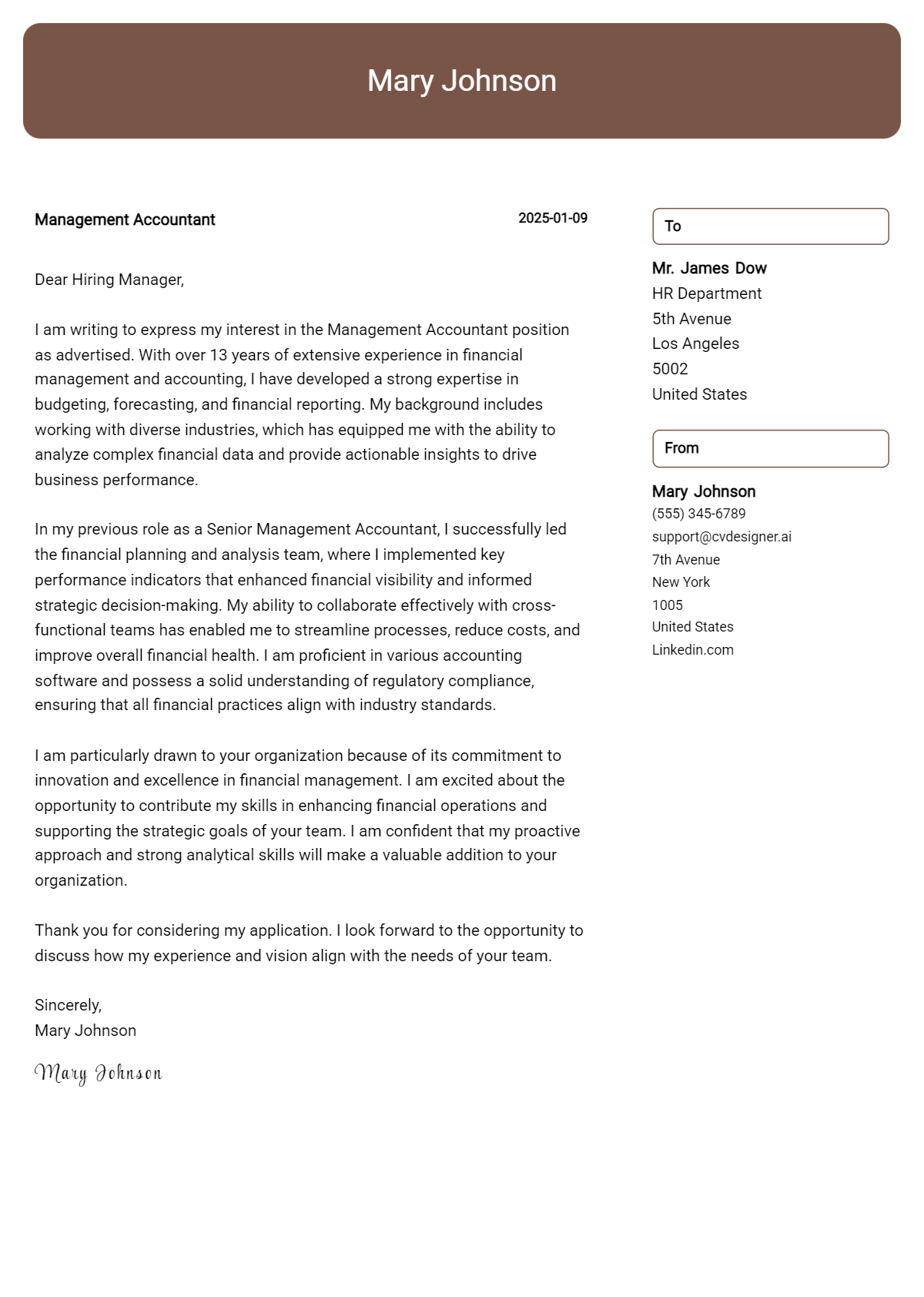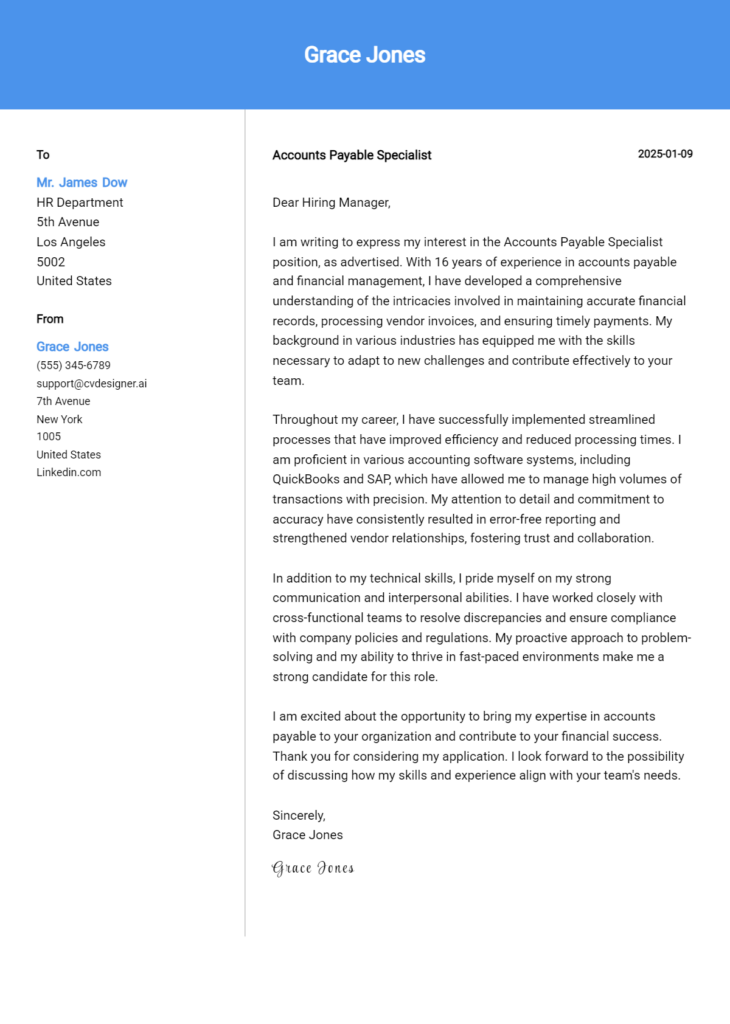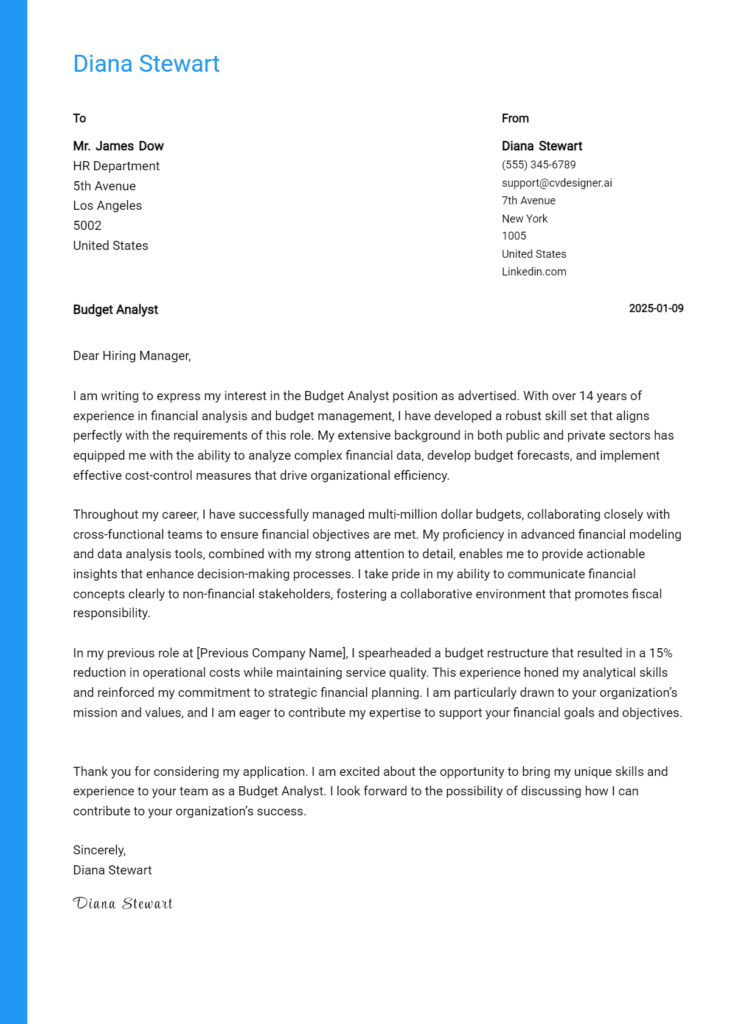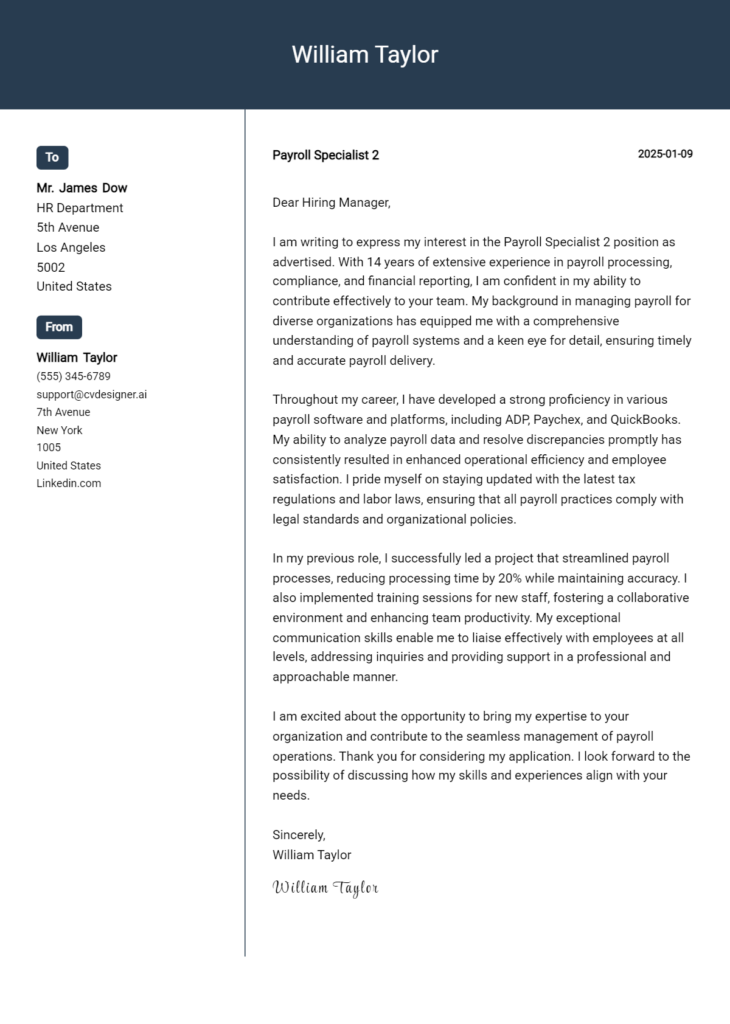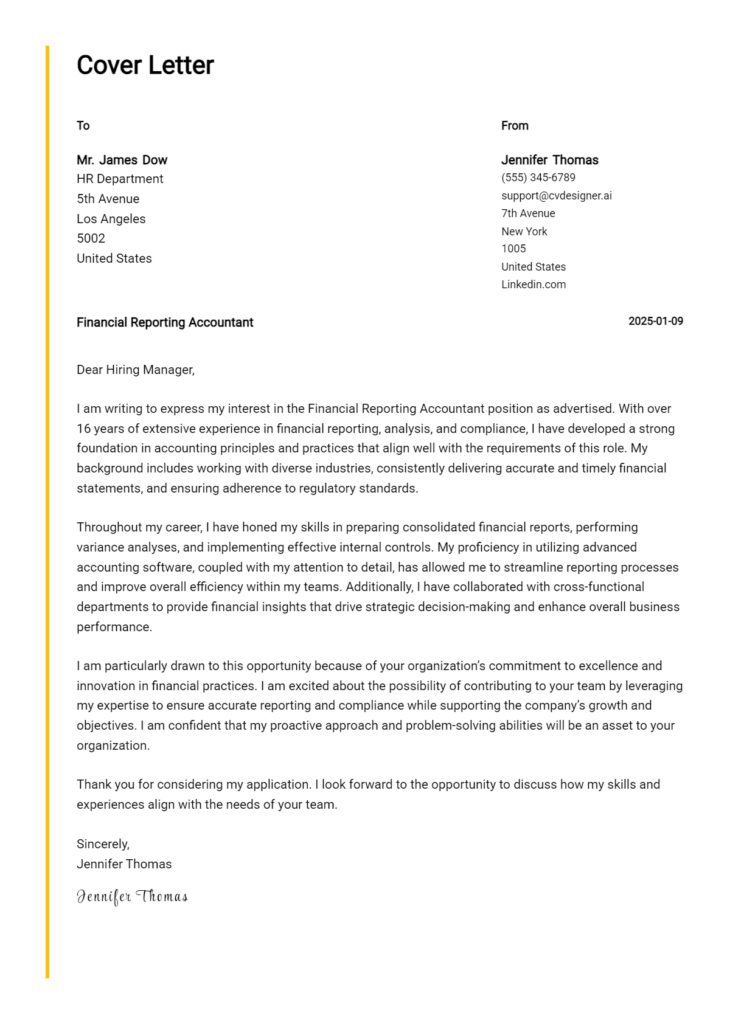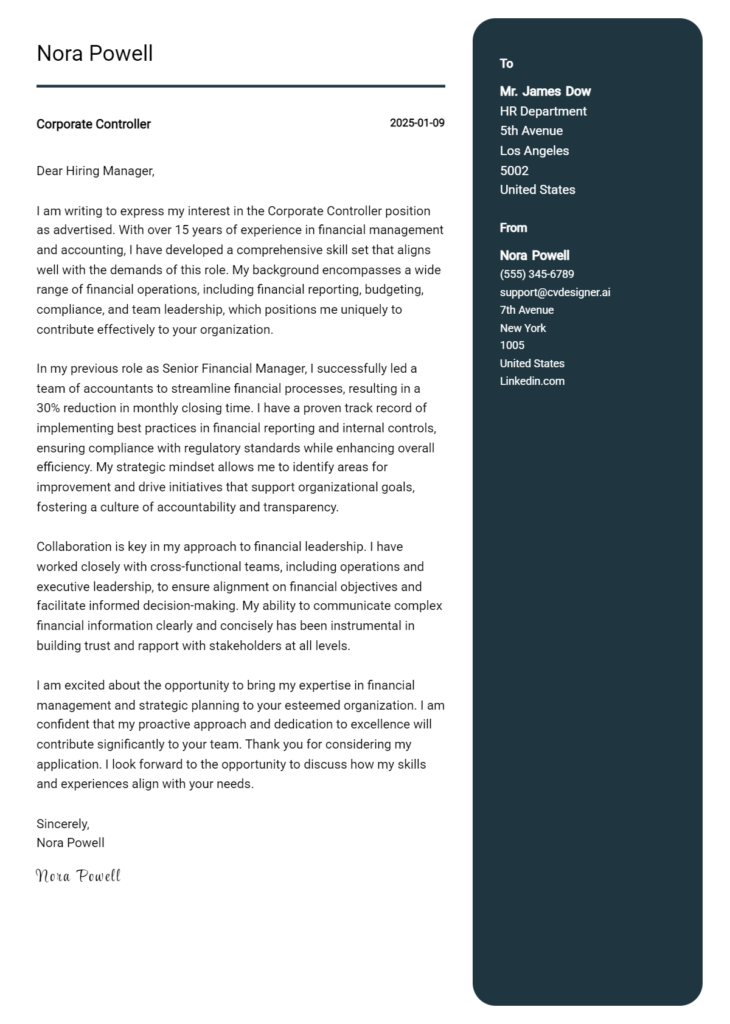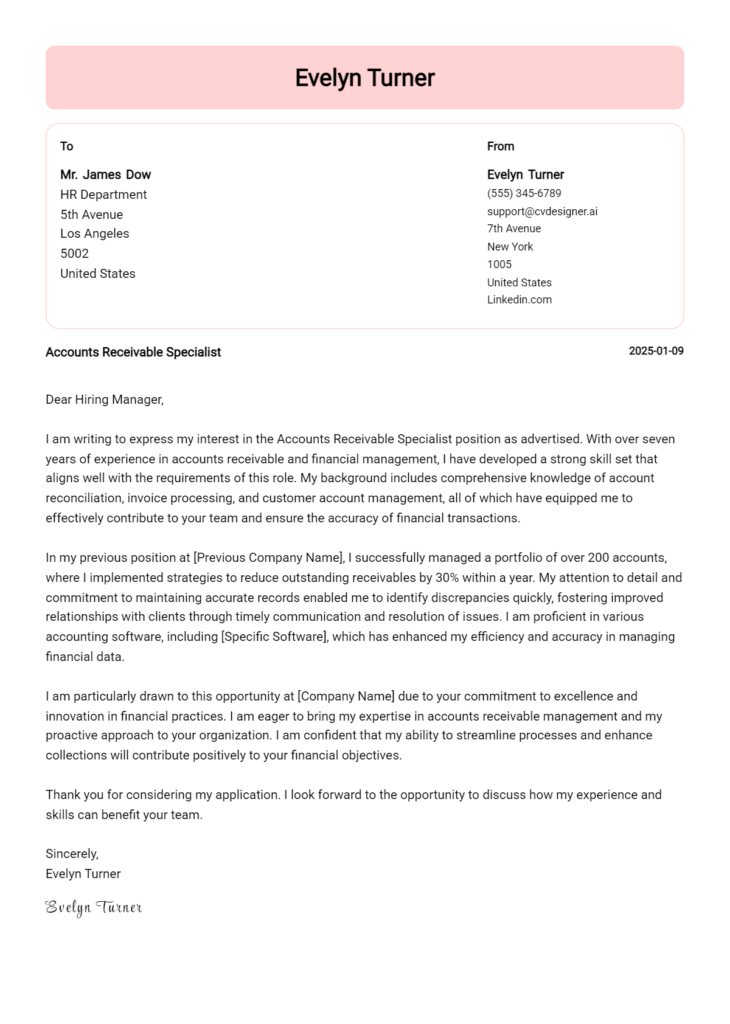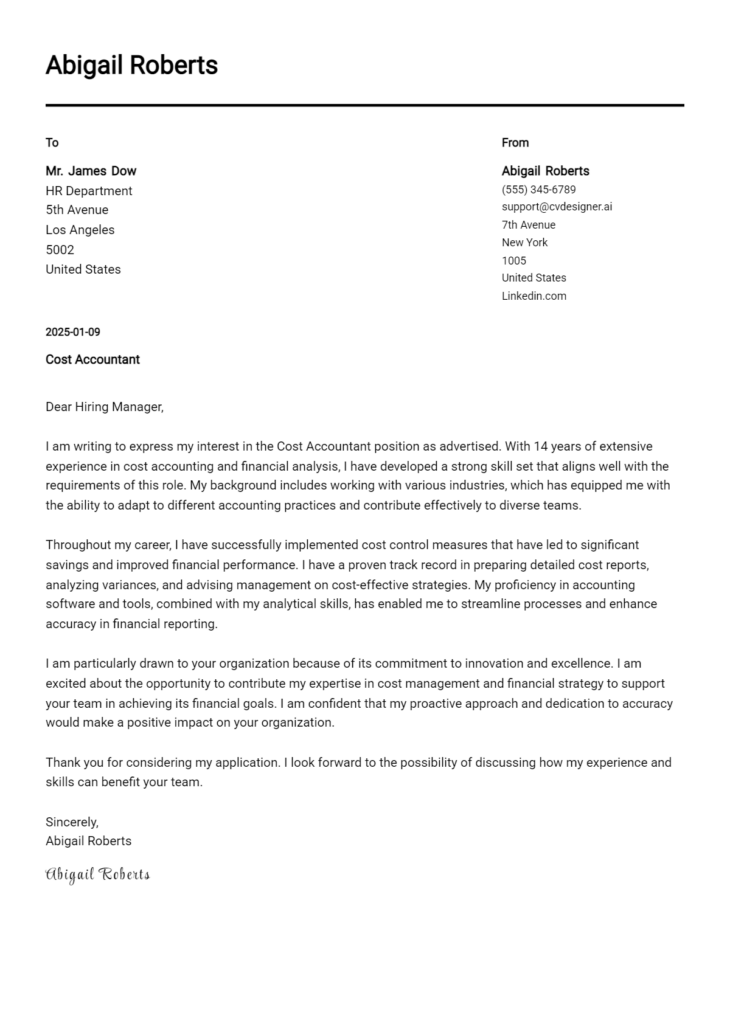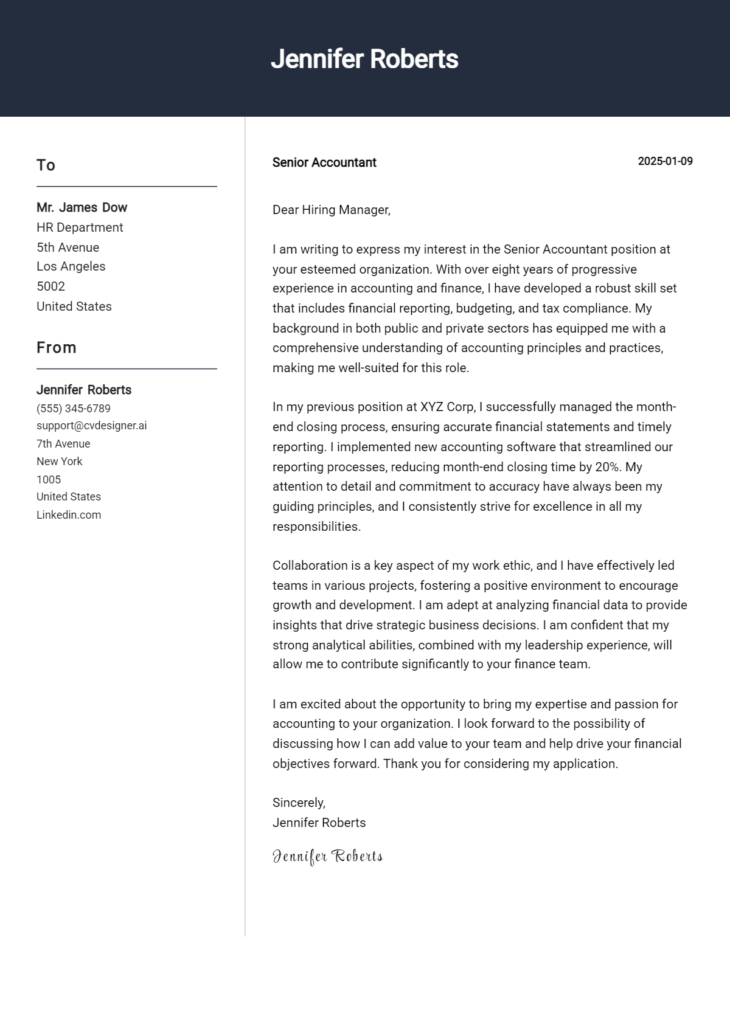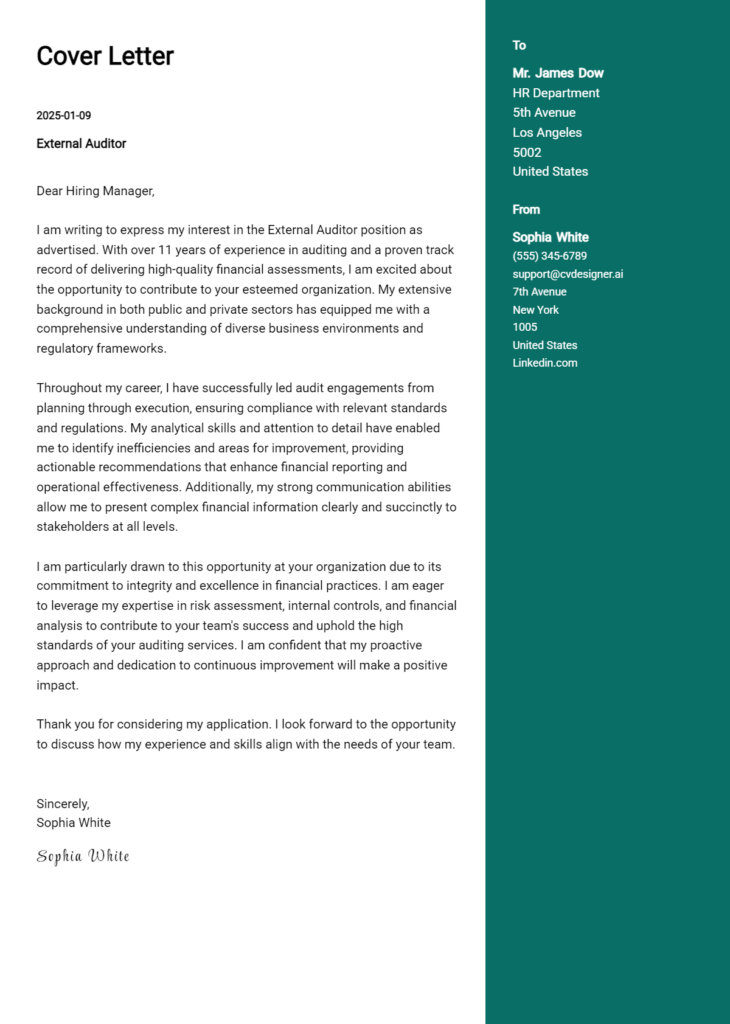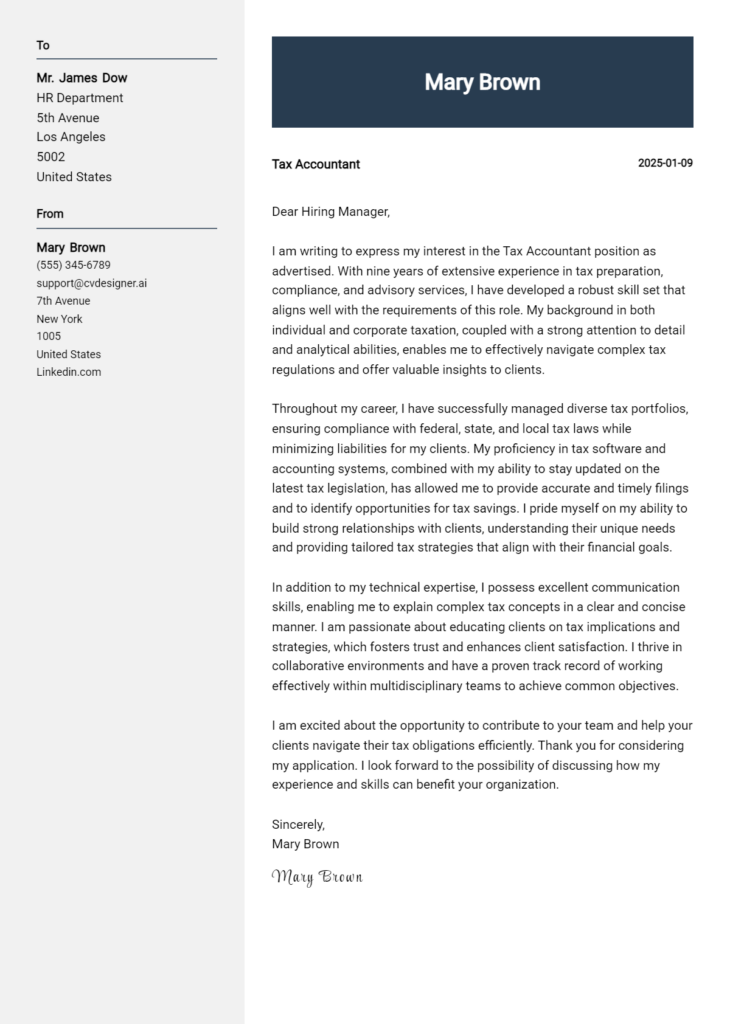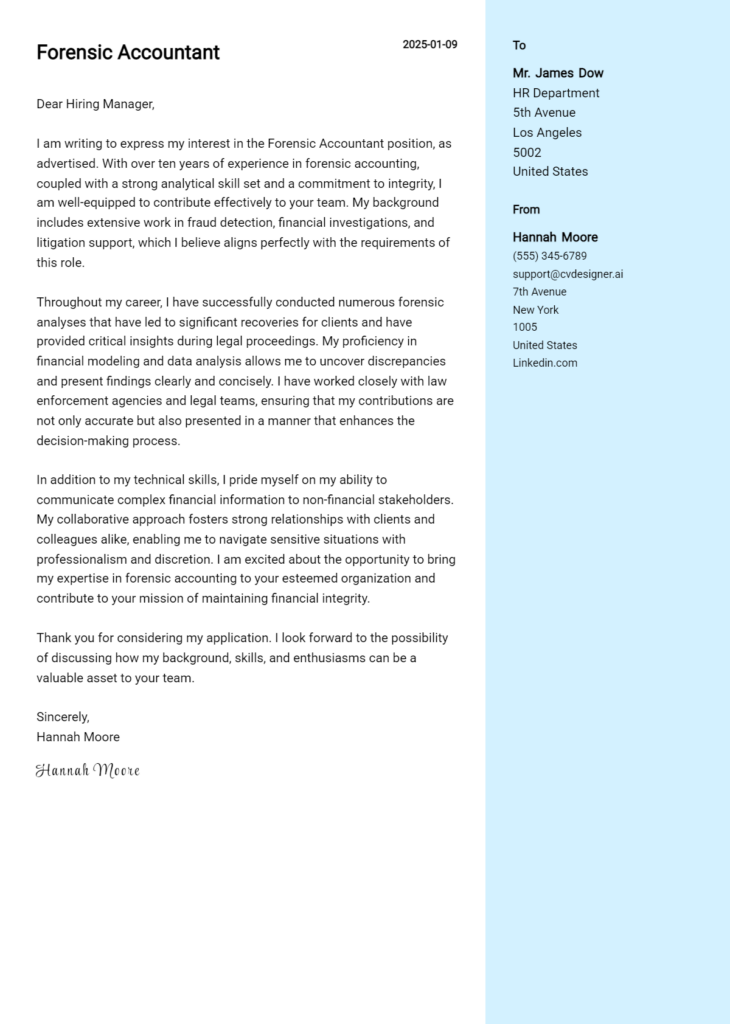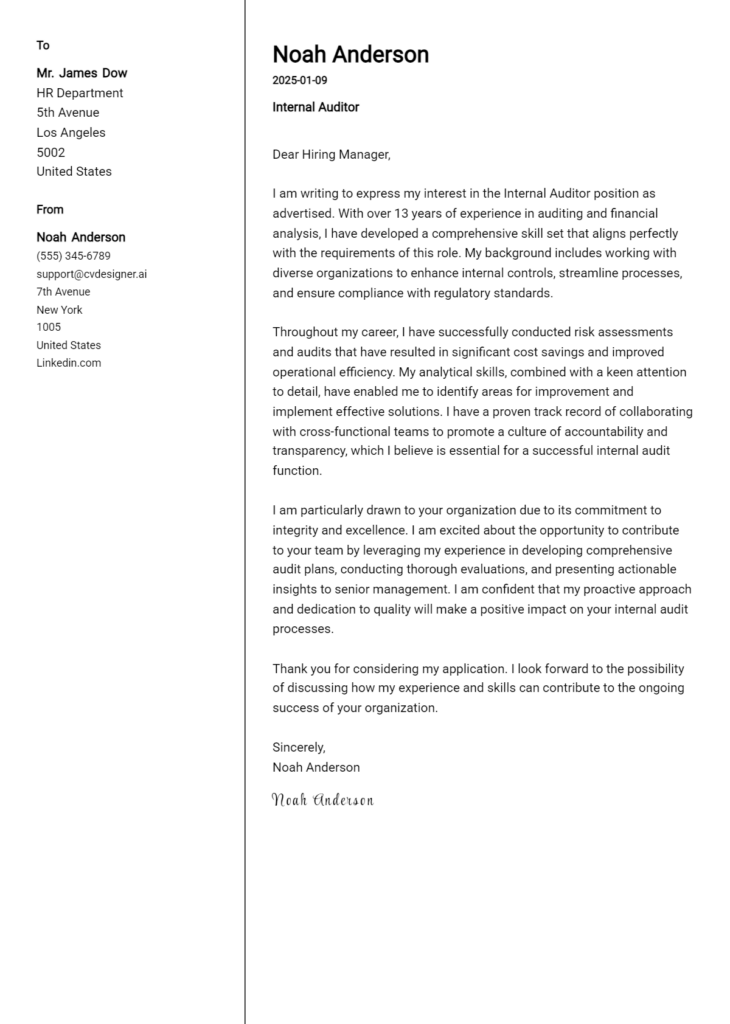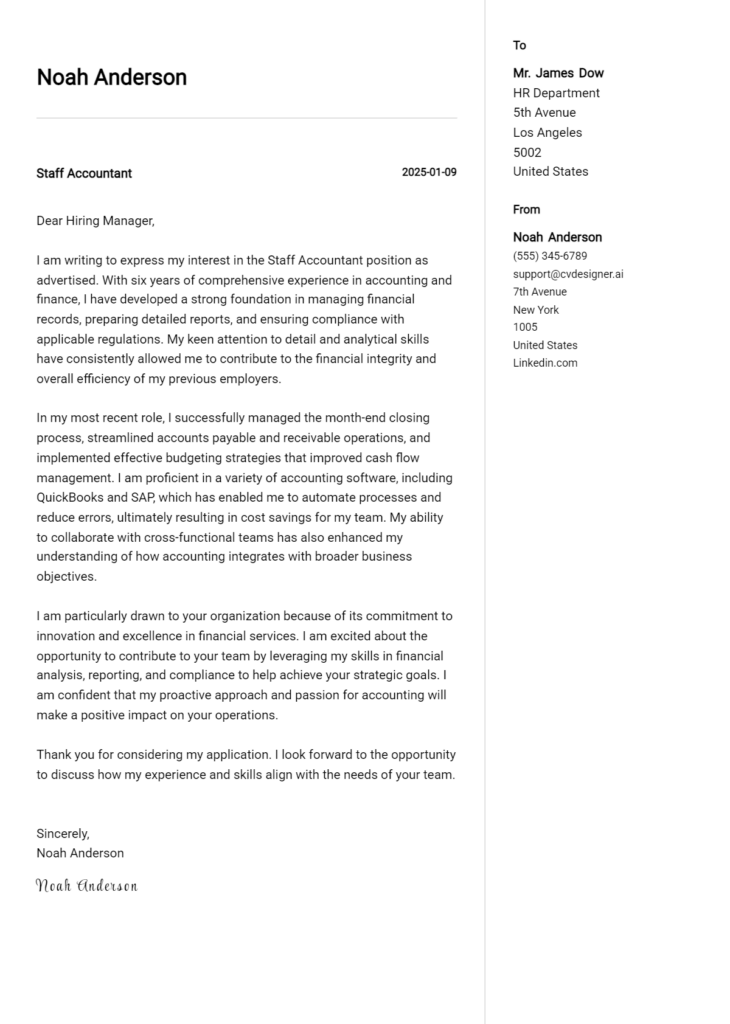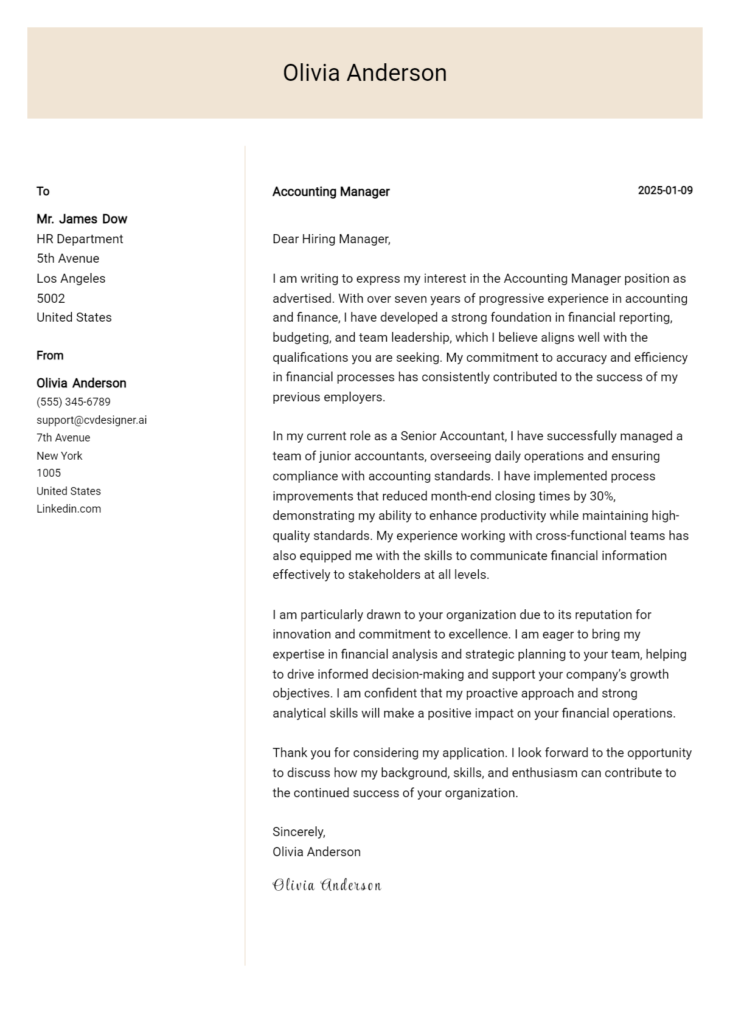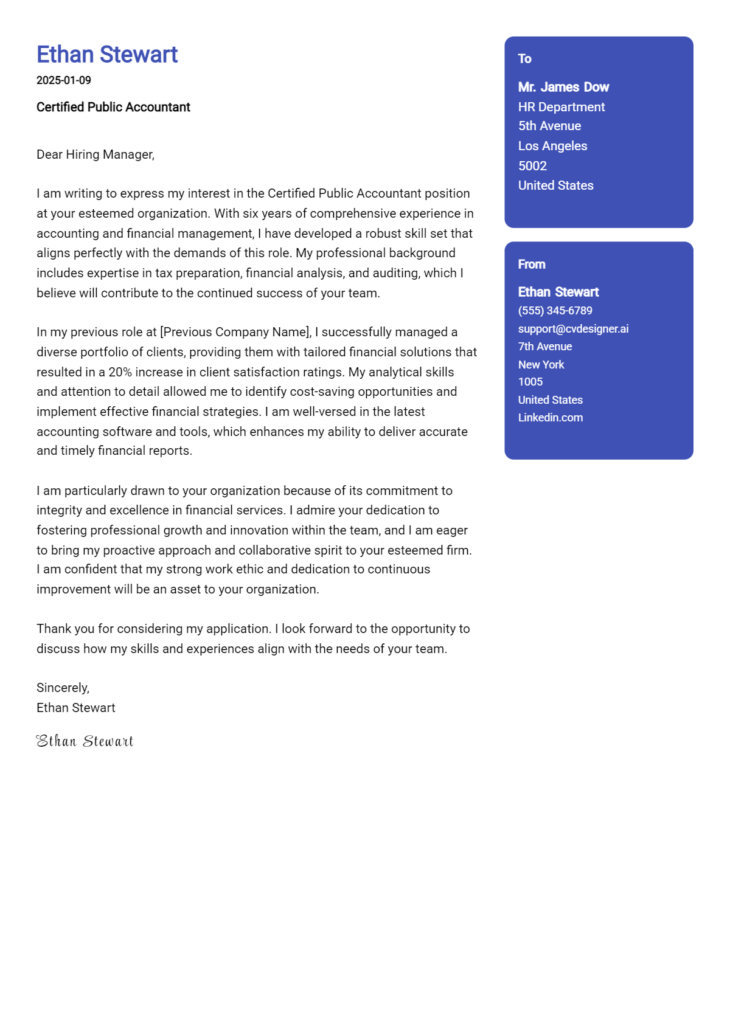Management Accountant Cover Letter Examples
Explore additional Management Accountant cover letter samples and guides and see what works for your level of experience or role.
How to Format a Management Accountant Cover Letter?
Crafting an effective cover letter is essential for a Management Accountant, as it serves as your first impression to potential employers. The way you format your cover letter is not just about aesthetics; it demonstrates your ability to communicate clearly and professionally, traits that are vital in the accounting field. A well-structured cover letter can set you apart from other candidates by reflecting your analytical skills and attention to detail.
In this guide, we will outline how to format your cover letter, focusing on the key components that will help you present your qualifications effectively.
We will cover the essential elements of a professional cover letter, including:
- Cover Letter Header
- Cover Letter Greeting
- Cover Letter Introduction
- Cover Letter Body
- Cover Letter Closing
Each section is crucial in emphasizing your abilities and professional demeanor. Let’s delve into each part to ensure your Management Accountant cover letter stands out in a competitive job market.
Importance of the Cover Letter Header for a Management Accountant
The cover letter header is a crucial element that sets the tone for your application as a Management Accountant. It serves as the first point of contact between you and the potential employer, making clarity and professionalism paramount. A well-structured header should include your contact information, the date, and the recipient's details. This information not only helps the hiring manager easily reach you but also demonstrates your attention to detail and organizational skills—qualities that are essential in accounting roles.
A strong header presents a clean, professional image, while a weak header can detract from your overall application. Below are examples of both a strong and a weak cover letter header for a Management Accountant.
Strong Example
John Doe 123 Accounting Lane Finance City, CA 90210 (123) 456-7890 johndoe@email.com October 10, 2023 Hiring Manager ABC Financial Services 456 Business Rd. Finance City, CA 90210
Weak Example
John D. (123) 456-7890 10/10/2023 To Whom It May Concern
The Importance of the Cover Letter Greeting for a Management Accountant
The greeting in a cover letter serves as the first impression for the hiring manager, setting the tone for the rest of the correspondence. A well-crafted greeting not only demonstrates professionalism but also personalizes the message, showcasing your attention to detail and genuine interest in the position. Addressing the hiring manager directly can create an immediate connection, making them more likely to engage with your application. To enhance this personalization, it's important to avoid generic greetings such as "To Whom It May Concern." Instead, take the time to research the recipient's name—this can often be found on the company website or through LinkedIn. A targeted greeting reflects your enthusiasm for the role and your commitment to the application process.
Strong Greeting Example
Dear Ms. Smith,
Weak Greeting Example
To Whom It May Concern,
The Importance of a Compelling Cover Letter Introduction for a Management Accountant
A well-crafted cover letter introduction is crucial for a Management Accountant as it serves as the first impression to the hiring manager. This opening paragraph should not only capture attention but also communicate the candidate's genuine interest in the role. Additionally, it should briefly showcase key skills or achievements relevant to the position, setting the tone for the rest of the application. A strong introduction can distinguish a candidate from others, while a weak one may undermine the entire effort. Below are examples of both strong and weak cover letter introductions to illustrate the difference.
Strong Example
Dear [Hiring Manager's Name], I am writing to express my enthusiasm for the Management Accountant position at [Company Name] as advertised on [Job Board]. With over five years of experience in financial reporting and analysis, coupled with a proven track record of improving budget accuracy by 30%, I am excited about the opportunity to contribute my expertise to your team. My commitment to delivering strategic insights and fostering financial integrity aligns perfectly with [Company Name]'s vision of achieving excellence in financial management.
Weak Example
To whom it may concern, I am applying for the Management Accountant job. I have some experience in finance and I think I could do well in this position. I hope to bring my skills to your company and help out where I can.
Purpose of the Cover Letter Body for a Management Accountant
The body of a cover letter for a Management Accountant serves to effectively communicate the candidate's expertise in financial management, analytical skills, and ability to contribute to the overall strategic goals of the organization. It is an opportunity to highlight relevant experiences and specific projects that showcase achievements, such as successful budget management, cost reduction initiatives, or the implementation of financial reporting systems. By providing concrete examples of past accomplishments, the candidate can demonstrate their value to potential employers and illustrate how their skills align with the needs of the company.
Strong Example
I successfully led a project to streamline our budgeting process, which resulted in a 15% reduction in expenses over the fiscal year. By implementing a new financial reporting system, I improved the accuracy of our forecasts and enhanced the decision-making capabilities of senior management. Additionally, my role in developing a comprehensive cost analysis framework contributed to identifying key areas for investment that increased overall profitability by 10%. My proactive approach and strong analytical skills have consistently driven financial performance, making me a valuable asset to any team.
Weak Example
I have experience in accounting and have worked on various projects. I can handle budgets and reports. I believe I can help your company with its financial needs. I am a hardworking person and am willing to learn more about the role.
Importance of the Cover Letter Closing for a Management Accountant
The closing paragraph of a cover letter is crucial as it summarizes your qualifications, reinforces your enthusiasm for the role, and encourages the hiring manager to take the next steps, such as reviewing your resume or scheduling an interview. A well-crafted closing can leave a lasting impression and demonstrate your professionalism and readiness for the position.
Strong Example
Thank you for considering my application for the Management Accountant position at [Company Name]. With my extensive experience in financial reporting and analysis, coupled with my passion for optimizing financial performance, I am excited about the opportunity to contribute to your team. I look forward to discussing how my skills and background align with your needs. Please feel free to contact me to schedule an interview at your earliest convenience.
Weak Example
I think I would be a good fit for the job. Please look at my resume. I hope to hear from you soon.
These tips are designed to help candidates craft an effective cover letter for a Management Accountant position. A well-written cover letter not only introduces you to potential employers but also highlights your technical skills, problem-solving abilities, knowledge of the Software Development Life Cycle (SDLC), teamwork experience, and a commitment to continuous learning. Here are five detailed tips to enhance your cover letter:
Tips for Crafting a Cover Letter for Management Accountant
Highlight Your Technical Skills
Clearly articulate your technical competencies, such as proficiency in accounting software (e.g., SAP, Oracle, QuickBooks) and financial modeling. Use specific examples to illustrate how these skills have contributed to your previous roles. This not only demonstrates your expertise but also shows your ability to leverage technology to improve financial processes.Showcase Problem-Solving Abilities
Employers value candidates who can identify issues and propose effective solutions. Share a brief anecdote where you successfully resolved a financial discrepancy or improved a reporting process. Quantify the impact of your actions, such as time saved or costs reduced, to showcase your analytical skills.Demonstrate SDLC Knowledge
If you have experience with financial systems development or enhancements, mention your familiarity with the Software Development Life Cycle. Explain how your understanding of SDLC processes contributes to your ability to work with IT teams effectively, ensuring the integration of finance and technology in projects.Emphasize Teamwork and Collaboration
Management Accountants often work closely with various departments. Highlight your experience in collaborative projects, such as cross-departmental budgeting or financial analysis. Illustrate how your teamwork skills have led to successful outcomes and fostered a positive work environment.Express a Passion for Continuous Learning
In an ever-evolving field, showing a commitment to professional development is crucial. Mention any relevant certifications (e.g., CMA, CPA) or courses you are pursuing. This demonstrates your proactive approach to staying updated with industry trends and best practices, which can be a critical asset to potential employers.
For additional resources, consider exploring various cover letter templates or using a cover letter builder to help format and refine your content.
Common Mistakes to Avoid in a Management Accountant Cover Letter
Avoiding common mistakes in your cover letter is crucial for standing out as a strong candidate for a Management Accountant position. A well-crafted cover letter can set you apart from other applicants, while errors can undermine your professionalism. Here are some common pitfalls to steer clear of:
Generic Language: Using a one-size-fits-all template can make your cover letter feel impersonal. Tailor your content to the specific job and company to demonstrate genuine interest.
Neglecting Formatting: Poor formatting can distract from your qualifications. Follow a clean and professional cover letter format to ensure readability.
Focusing on Duties Instead of Achievements: Simply listing past job responsibilities does not highlight your unique contributions. Instead, emphasize specific achievements and how they relate to the role.
Ignoring the Job Description: Failing to address the key skills and qualifications mentioned in the job description can weaken your application. Make sure to mirror the language used in the posting.
Poor Spelling and Grammar: Typos and grammatical errors can give a negative impression of your attention to detail. Always proofread your letter, and consider using tools or a second pair of eyes for review.
Lack of Enthusiasm: A bland tone can make your letter forgettable. Show enthusiasm for the role and the company to convey your motivation.
Not Including a Call to Action: Failing to invite the reader to discuss your application further can leave your letter feeling incomplete. End with a strong closing statement that encourages follow-up.
By being mindful of these common mistakes, you can enhance your chances of crafting a compelling cover letter. For further inspiration, check out these cover letter examples.
Cover Letter FAQs for Management Accountant
What should I include in my cover letter as a Management Accountant?
In your cover letter, you should highlight your relevant qualifications, such as your degree in accounting or finance, and any professional certifications like CMA or CPA. Discuss your experience in budgeting, forecasting, and financial analysis, emphasizing how these skills can benefit the prospective employer. Include specific examples of past achievements, such as cost-saving initiatives or successful financial reporting projects. Additionally, express your understanding of the company's industry and how your expertise aligns with their goals. Finally, convey your enthusiasm for the role and your eagerness to contribute to the company’s financial success.
How can I demonstrate my analytical skills in the cover letter?
To demonstrate your analytical skills, provide concrete examples of how you have utilized them in previous roles. For instance, describe a time when you identified a financial discrepancy and resolved it, or explain how your analysis led to improved budgeting processes. Use metrics to quantify your impact, such as percentage improvements in efficiency or cost reductions achieved through your recommendations. Additionally, mention any relevant software or tools you are proficient in, such as Excel, SAP, or financial modeling software, to further reinforce your analytical capabilities.
Should I tailor my cover letter for each job application?
Yes, tailoring your cover letter for each job application is crucial. Each company has unique needs and values, and a customized cover letter allows you to address those specifics. Research the company’s mission, values, and recent achievements to weave relevant information into your letter. Highlight how your skills and experiences align with the job description and the organization’s goals. A targeted cover letter not only showcases your interest in the position but also demonstrates your proactive approach and commitment to understanding the company, increasing your chances of standing out to hiring managers.
How long should my cover letter be for a Management Accountant position?
Your cover letter should ideally be one page long, consisting of three to four paragraphs. This length allows you to provide enough detail about your qualifications and experiences without overwhelming the reader. Aim for clarity and conciseness: each paragraph should focus on a specific aspect of your candidacy, such as your background, skills, and enthusiasm for the role. By maintaining a professional tone and clear structure, you can effectively convey your message while respecting the hiring manager's time. Remember to leave a strong closing that invites further discussion.
Build your Cover Letter in minutes
Use an AI-powered cover letter builder and have your letter done in 5 minutes. Just select your template and our software will guide you through the process.

